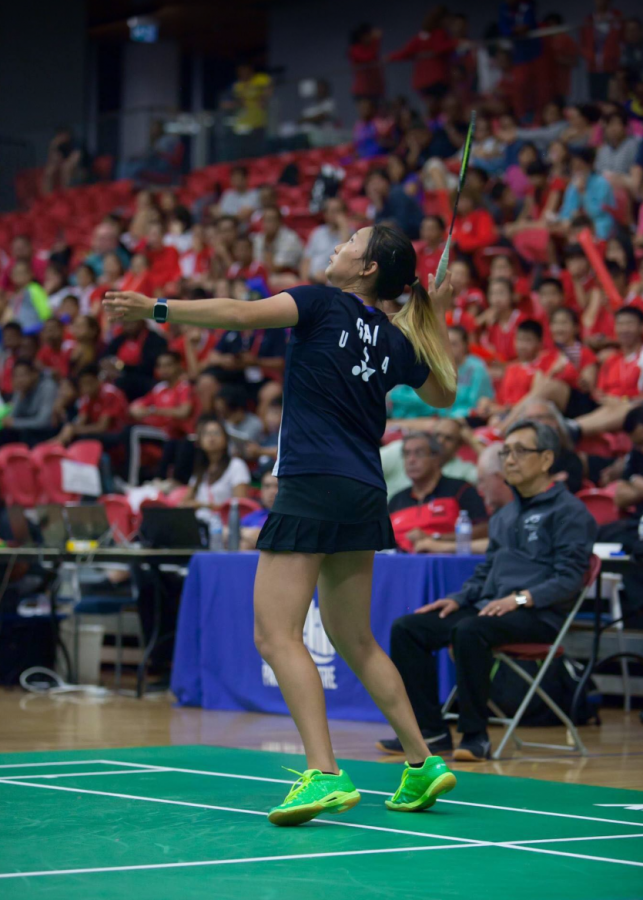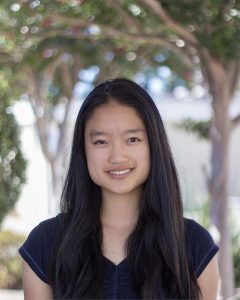Birdie Taking Flight: Jennie Gai Sets her Sights on the 2020 Olympics
May 18, 2018
It is a rarity to witness a budding professional athlete rise up through the ranks of their sport while still attending traditional public school. On the outside, she might appear as a typical, fun-loving junior, forever clad in a pair of Yonex joggers, but on the court, Jennie is a world-class athlete.
Jennie first stepped onto the court at age eight, after an excursion with her father to a local community badminton court sparked her interest in the sport. Soon after, Jennie took on the hobby and started training at a local badminton club on a weekly basis.
“I honestly had nothing better to do. I wasn’t musically talented, and it was something to look forward to everyday,” said Gai. “My parents always wanted me to play a sport, so when my dad asked me to choose between badminton and tennis, I chose badminton; tennis is too much sun.”
At ten, Jennie started competing in the junior division. At first, she simply looked forward to making new friends at each tournament.
“I wasn’t very good at first, but what made me stay was the close friendships I made. I guess suffering [through] physical torture together creates a pretty strong bond,” said Gai. “Eventually, I started improving and winning, and that felt nice, and by that point, I was too in to badminton to start something else.”
Fast forward through middle school and those improvements catapulted Jennie to emerging success at the senior level.
The 2016 Badminton World Federation (BWF) Uber Cup marked Jennie’s debut into the adult arena. After previously qualifying for the Pan American team in Guadalajara, Mexico in February of that year, Jennie flew to Kunshan, China for the Uber Cup. There, she played amongst some of the world’s most seasoned athletes and had the opportunity to watch those athletes that she had previously only watched on TV tackle the court before her eyes.
“It was a really eye-opening experience, and I actually got to take pictures with a few of them,” said Gai. “Although since China’s team is so professional and strict, it was really awkward to just go up to [them].”
Her first senior tournaments were also where Jennie realized the stark difference between junior and senior tournaments. While players mingled at the junior level, senior athletes were more serious and professional and more often stuck with their own team and country.
Apart from the social aspect, the competitive atmosphere was obviously also elevated a couple of octaves.
“When you walk onto the court, everything feels bigger, and there’s a lot more people staring at you,” said Gai. “You just have to kind of block them out and try your best, and you get used to it eventually.”
In 2017, Jennie participated in the World Mixed Team Championships, the BWF Sudirman Cup, in Gold Coast, Australia, and with each successive match at world tournaments in the following months, Jennie’s resume of accolades grew.
Most recently, Jennie qualified for the Junior Olympic Games this coming October in Buenos Aries, Argentina.
“The qualification requires a total of [at least] seven junior tournaments, and originally I wasn’t going to go for it,” said Gai. “But in February, I had already gone to three adult tournaments, and my dad said ‘if you play some tournaments, you might actually make it,’ so I played some junior tournaments in Greece and Indonesia and another in Guatemala, and I ended up getting enough points to qualify for the Games.”
Currently, Jennie is ranked 24 in Junior Women’s Singles and 138 in Senior Women’s Singles in the world. Of course, arriving at these milestones demanded an immense volume of training. These days, Jennie trains four days a week at Synergy Badminton Club in Menlo Park while balancing the academic workload of a typical high school junior, AP classes and standardized tests in tow.
“Right now, it’s manageable to skip school for a few days and keep up most of the time. My parents don’t want me homeschooled, and I guess they want to show that you can still play internationally while continuing a public school education,” said Jennie. “I’ve gotten kind of used to the process of getting the homework in order to keep up. It’s not going to be perfectly fine, but it is a sacrifice I’m willing to take to play in the tournaments.”
Badminton is not as recognized a sport in the United States as it is in Asian and European countries. It is common for elite badminton athletes in the US to pursue a college education and degrees during or after their professional careers. In contrast, athletes in countries like China, where the popularity of this sport magnifies the competition to celebrity standards, devote themselves entirely to the sport, solely focusing on their trade to keep their edge.
“They have a national team, and their coaches are often former world champions,” said Gai. “It definitely helps [if you are sponsored] to play badminton for a living.”
For now, Jennie has her long-term sights set on the 2020 Summer Olympic Games in Tokyo, Japan. To train herself to that point, Jennie is already racking up a checklist of areas she needs to master.
“I need to improve on speed, explosiveness, technique, and experience,” said Gai. “When the point is really close, the one that has more experience and knows when to be patient [wins], and that experience comes with playing more tournaments.”
Jennie warrants a lot of her success in pursuing professional athletics while staying in school to the unconditional support of her parents. For others hoping to follow a similar path, Jennie offers the utmost encouragement.
“It’s totally possible, but it depends on yourself. You have to want it. If I didn’t want it, my parents wouldn’t force me to waste their money,” said Gai. “I think if you really enjoy the sport and want to take on the challenge, just go for it!”










